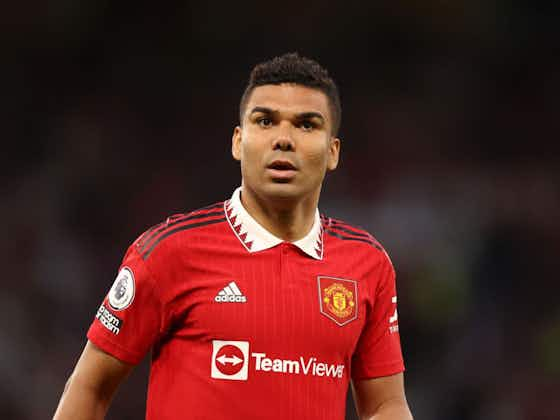The Independent
·2 June 2023
Casemiro promised to fix Manchester United - the FA Cup final can prove that he has

In partnership with
Yahoo sportsThe Independent
·2 June 2023

Manchester United were pointless and headed for humiliation. As Brentford scored four goals in a half – and the first half at that – and Erik ten Hag’s reign began amid farce, a footballer who had starred in four Champions League final victories reached for his phone. United’s most high-profile transfer target texted his agent.
But not to back out of a deal. The message, instead, was to tell United he would “fix” it.
It was a sign of Casemiro’s confidence. If that self-assurance is a product of a career of rare success – the Carabao Cup took his trophy count to 21 – many another would have been deterred by the impression United were in crisis. They might have stayed at Real Madrid. Not him.
“No second thoughts at all,” he recalled. “But to be honest I did say that. I was speaking to my agent, and with John [Murtough, United’s director of football] too about this afterwards. I’d said this after it had happened because I was also very excited and I was aware that my period at Real Madrid had come to an end and I was really upbeat about coming here and taking on this new project, this new challenge. It was clear in my mind.”
Eight months later, it is tempting to contemplate an alternative reality where, after missing out on Frenkie de Jong last summer, Casemiro was put off by the shambolic display at Brentford, where instead of being a £63 million method of transforming a team, there was still a void at the heart of the midfield.
“I knew that it wouldn’t be an easy challenge because it was a tough defeat to take but I think the excitement of coming here and making a change,” he reflected. Which he did: Casemiro provided a boost to United’s self-esteem even before he played, his unveiling at half-time of the win over Liverpool a sign of the club’s status. United only lost three of the first 32 games he started. He scored and was player of the match in the Carabao Cup final. United took 75 points from the 36 league matches after he joined and finished third.
“We knew that it was a project in which you wouldn’t start winning things overnight,” he said, but they could complete a cup double at Wembley on Saturday. It appears as though he has fixed it. “It’s impossible for a single player to change performances but as a squad you can,” he demurred.
Yet a turning point was October’s 6-3 defeat to Manchester City. Casemiro watched two-thirds of it from the bench: Ten Hag was still picking Scott McTominay ahead of him and if the Dutchman has made relatively few missteps, that seems one. The Brazilian marked his first Premier League start with an assist for Cristiano Ronaldo’s winner at Everton the following week. His first goal came a couple of weeks later, an injury-time equaliser at Chelsea. Each was a sign he tended to make telling contributions. Tallies of seven goals and six assists may be more than most expected; so, in a different way, are his two red cards.
But they underline his centrality. He has been a fulcrum for United, the man at the heart of everything. Which is how he thinks it ought to be. City’s galaxy of gifted midfielders mean Casemiro’s skills as a nullifier will be required if Kevin de Bruyne, Ilkay Gundogan and Bernardo Silva are to be kept quiet at Wembley.
“When people talk about central defensive midfielders, they forget that you need to help your teammates, you need to defend, to slot in between the centre-backs, cover any gaps that the full-backs or midfielders leave,” said a man who forged a reputation as the world’s best holding midfielder in Madrid, before offering an explanation for his greater productivity.
“These are the basic principles for a central defensive midfielder. Of course, beyond that, people want you to score goals, to pass the ball, to get the team playing because football’s changed. In the past it would be the No. 10 that would be required to do that.”
He can be both destructive and constructive presence, which he sees as a sign of the evolution in tactics. “I saw an interview with [Juan Roman] Riquelme once talking about central defensive midfielders and specifically [Sergio] Busquets,” Casemiro explained. “He said that often the team didn’t play well because the central holding midfielder hadn’t played [well] and people forget that throughout the history of football, it was the No. 10 who was the playmaker. The central defensive midfielder was always someone that helped the centre-backs, helped in the midfield, helped the full-backs, filled in and stopped counter attacks. The way that central defensive midfielders have had to adapt has changed a lot.”
But he will hope some things stay the same. He has an outstanding record in finals; with Real, United and Brazil, he has only lost one, in the 2018 European Super Cup. “Without doubt it’s a significant stat,” he said.
He also has experience of getting the better of City; Real trailed for 178 minutes of the Champions League semi-finals last season and yet still overcame Pep Guardiola’s team. “They play very good football and have a great manager and great players but every game is a different story, a different film,” he said.
But if the movie of United’s season started in ignominy and ended in glory, the Casemiro biopic might have a certain monotony, if only because he has won so much, so often.






























































